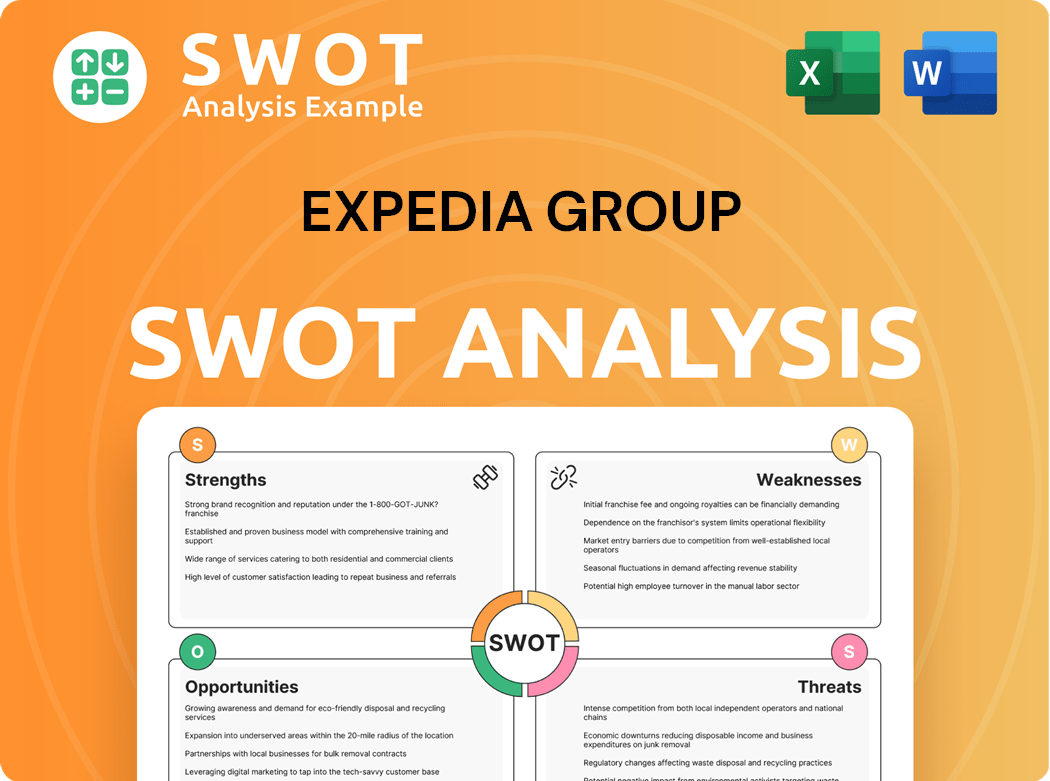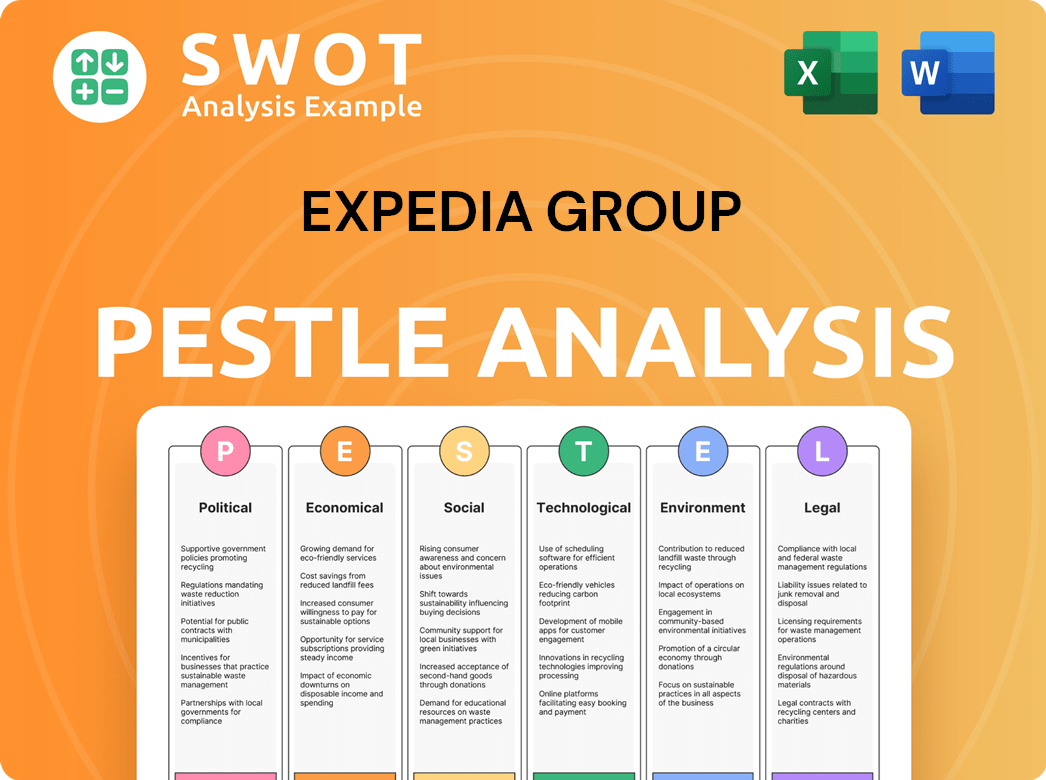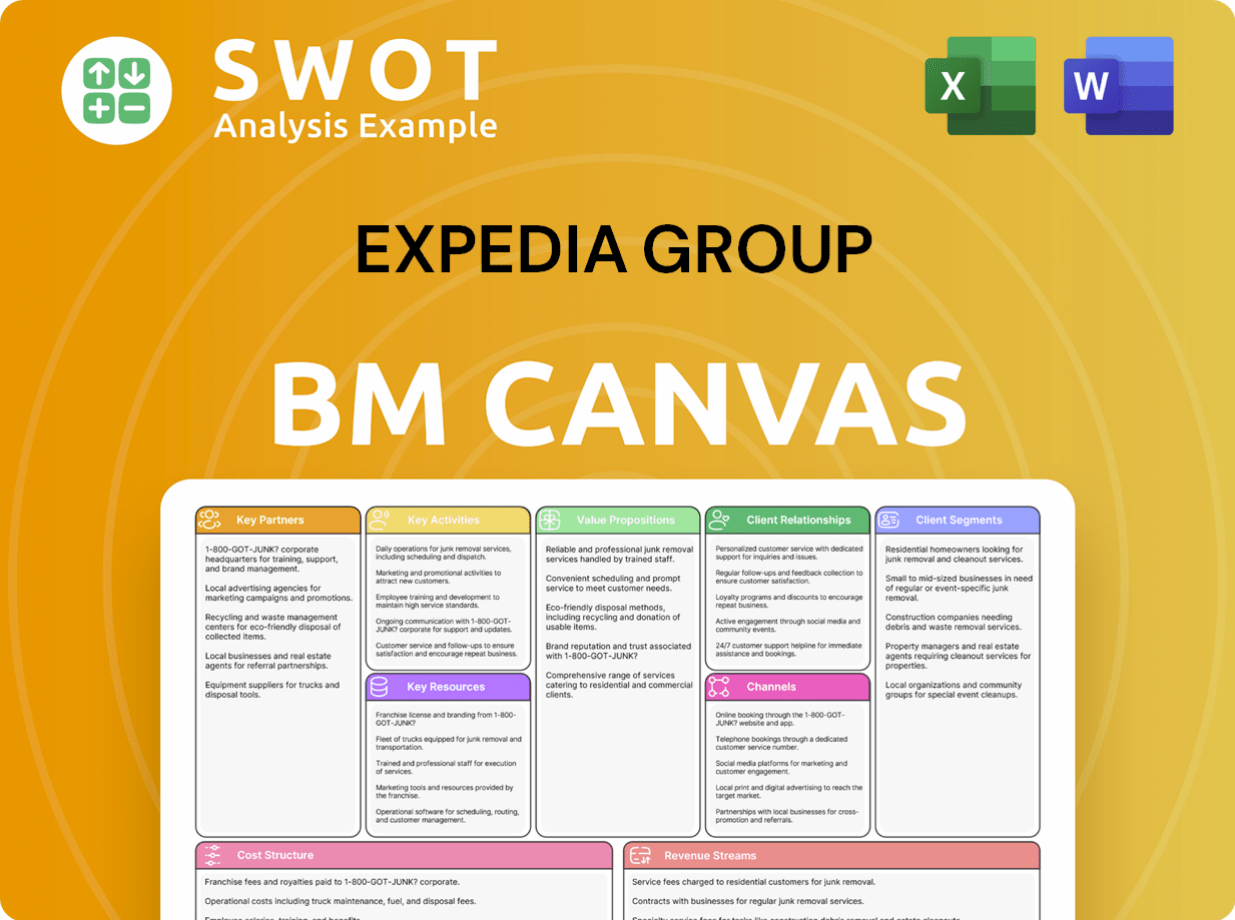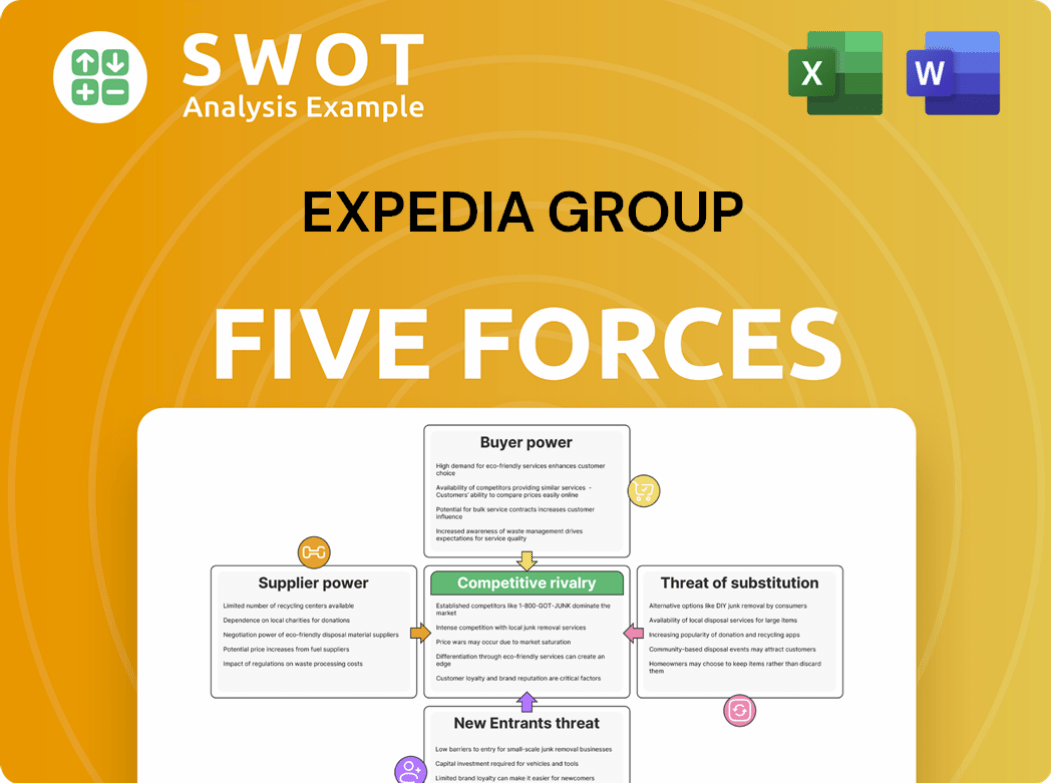Expedia Group Bundle
Can Expedia Group Continue Its Travel Industry Dominance?
From its humble beginnings as a Microsoft division in 1996, Expedia Group has revolutionized how we plan and book travel. The acquisition of Liberty Expedia Holdings in 2019 streamlined operations, setting the stage for ambitious growth in the ever-evolving online travel agency landscape. Today, Expedia Group stands as a global leader, but what strategies will ensure its continued success?

This analysis will explore the Expedia Group SWOT Analysis, delving into its strategic initiatives and future prospects. We'll examine the company's business model analysis, market share analysis, and how it's adapting to travel industry trends and market changes, including the impact of COVID-19. Understanding Expedia Group's revenue growth strategies and expansion plans is crucial to assessing its long-term growth potential in the competitive online travel booking sector.
How Is Expedia Group Expanding Its Reach?
The Expedia Group Growth Strategy involves several key initiatives designed to boost its market position and explore new revenue streams. These strategies are crucial for navigating the dynamic Travel Industry Trends and maintaining a competitive edge in the Online Travel Agency (OTA) landscape. By focusing on innovation and strategic partnerships, the company aims to capitalize on emerging opportunities and adapt to evolving consumer preferences.
A core element of the Expedia Group Company's expansion strategy is enhancing its B2B segment, specifically Expedia Group Media Solutions. This segment provides advertising and media services to travel suppliers. This approach aims to deepen relationships with airlines, hotels, and other travel providers, offering them advanced tools and data-driven insights to connect with travelers. This diversification supports Expedia Group's financial performance and growth.
Another critical area of focus is optimizing its core platforms, particularly Vrbo. This involves investing in technology to improve user experience for both property owners and travelers. The company is also expanding its inventory and refining search functionalities to better match travelers with unique stays. These initiatives are designed to capture new customer segments and strengthen existing relationships with suppliers.
Expedia Group is strengthening its B2B segment, Expedia Group Media Solutions. This involves offering advanced advertising and media services to travel suppliers. The goal is to provide suppliers with sophisticated tools and data-driven insights to reach travelers more effectively.
The company is investing in Vrbo to improve user experience and expand inventory. This includes enhancing technology for property owners and travelers. The focus is on refining search functionalities to match travelers with unique accommodations.
Expedia Group is improving its loyalty programs across its brands. This aims to increase customer retention and lifetime value. The strategy includes offering more personalized rewards and benefits to customers.
The company leverages its extensive data to create tailored travel offerings. This approach allows Expedia to better understand customer preferences. The goal is to provide more compelling travel experiences.
The strategic initiatives are designed to capture new customer segments, strengthen supplier relationships, and leverage data. These efforts are crucial for driving Expedia Group's Future Prospects and maintaining its position in the competitive travel market. For a deeper dive into the strategies, consider reading about the Marketing Strategy of Expedia Group.
- Enhancing B2B services to diversify revenue streams.
- Optimizing platforms like Vrbo to cater to alternative accommodation demand.
- Improving loyalty programs to boost customer retention.
- Utilizing data to personalize travel offerings.
Expedia Group SWOT Analysis
- Complete SWOT Breakdown
- Fully Customizable
- Editable in Excel & Word
- Professional Formatting
- Investor-Ready Format

How Does Expedia Group Invest in Innovation?
The Expedia Group Growth Strategy heavily relies on technological innovation to maintain its competitive edge in the dynamic Online Travel Agency (OTA) market. The company continuously invests in research and development, focusing on enhancing its platforms through automation and the integration of advanced technologies. This commitment is crucial for adapting to evolving Travel Industry Trends and meeting the changing demands of travelers.
A core element of Expedia Group's Future Prospects involves leveraging artificial intelligence (AI) and machine learning. These technologies are used to personalize travel recommendations, optimize pricing strategies, and improve customer service interactions. By analyzing vast amounts of data, Expedia aims to provide users with more relevant and tailored experiences, ultimately increasing conversion rates and customer satisfaction. This data-driven approach is central to their Expedia Group Company strategy.
Market Analysis Expedia reveals a strategic focus on cloud-based infrastructure to improve scalability, performance, and data security. This move supports the unification of its technology stack across core brands like Expedia, Hotels.com, and Vrbo. The goal is to create a more seamless and efficient experience for both travelers and partners, streamlining development, reducing operational costs, and accelerating the deployment of new features.
AI algorithms analyze user data to offer personalized travel recommendations, enhancing the user experience. This includes suggesting relevant hotels, flights, and activities. This approach improves conversion rates and customer satisfaction.
Investments in cloud-based infrastructure improve scalability, performance, and data security. This supports the unification of the technology stack across core brands. This streamlines development and reduces operational costs.
The company aims to unify its technology stack across core brands such as Expedia, Hotels.com, and Vrbo. This creates a more seamless experience for both travelers and partners. This streamlining accelerates the deployment of new features.
Automation plays a key role in streamlining operations and improving efficiency. This includes automated customer service tools and processes. These improvements lead to cost savings and better service.
Prioritizing data security is crucial in protecting user information and maintaining trust. Cloud infrastructure enhances data security measures. This is essential for compliance and customer confidence.
Expedia Group's commitment to continuous innovation ensures it remains competitive. Ongoing R&D investments are a key part of the strategy. This helps adapt to changing market demands and trends.
Expedia Group's business model analysis reveals a strong emphasis on technology to enhance the customer experience and drive revenue. Key strategic initiatives include:
- Personalized Recommendations: Utilizing AI to provide tailored travel suggestions.
- Dynamic Pricing: Employing algorithms to optimize pricing and maximize revenue.
- Enhanced Customer Service: Implementing AI-powered chatbots and support systems.
- Platform Consolidation: Unifying technology across brands for efficiency.
- Cloud Migration: Improving scalability, performance, and data security.
For a deeper understanding of the company's financial structure, explore Revenue Streams & Business Model of Expedia Group.
Expedia Group PESTLE Analysis
- Covers All 6 PESTLE Categories
- No Research Needed – Save Hours of Work
- Built by Experts, Trusted by Consultants
- Instant Download, Ready to Use
- 100% Editable, Fully Customizable

What Is Expedia Group’s Growth Forecast?
The financial outlook for Expedia Group, a leading Online Travel Agency, is centered on strategic investments and enhanced operational efficiency. The company's Expedia Group Growth Strategy includes focusing on profitable growth and optimizing marketing spend. This approach is designed to support long-term financial objectives within the dynamic travel market. Understanding the Expedia Group Company's financial performance is key to assessing its future.
In Q1 2024, Expedia Group reported a 5% year-over-year increase in revenue, reaching $2.8 billion. Lodging revenue increased by 6%, and air revenue saw a 2% rise. Gross bookings increased by 3% to $30.2 billion. Despite a net loss of $135 million in Q1 2024, an improvement from a $145 million loss in Q1 2023, adjusted EBITDA was $24 million, significantly better than the $81 million loss in the prior year's quarter. These figures highlight the company's efforts to improve profitability and operational efficiency.
For the full year 2024, Expedia Group anticipates adjusted EBITDA growth in the low-to-mid single digits. This projection reflects a strategic shift towards improving profitability and efficiency. The company's focus on key growth areas, like B2B partnerships and platform unification, is expected to support its long-term financial goals. Analyzing these trends provides insight into the Expedia Group Future Prospects.
Expedia Group's revenue increased by 5% year-over-year in Q1 2024, reaching $2.8 billion. This growth was driven by increases in both lodging and air revenue, reflecting a positive trend in the travel industry. The revenue growth demonstrates the company's ability to capitalize on Travel Industry Trends.
Gross bookings for Expedia Group saw a 3% increase to $30.2 billion in Q1 2024. This increase indicates sustained consumer demand for travel services. This metric is crucial for understanding the company's overall market position and Market Analysis Expedia.
Expedia Group improved its net loss from $145 million in Q1 2023 to $135 million in Q1 2024. Adjusted EBITDA significantly improved to $24 million, compared to an $81 million loss in the prior year's quarter. This improvement reflects the company's focus on operational efficiency.
For the full year 2024, Expedia Group expects adjusted EBITDA growth in the low-to-mid single digits. This forecast suggests a continued focus on profitability and efficiency. The company is actively managing its investment levels to support its financial goals.
The company's strategic initiatives and financial performance are crucial in understanding its position within the competitive landscape. For a broader perspective, consider the Competitors Landscape of Expedia Group.
Expedia Group Business Model Canvas
- Complete 9-Block Business Model Canvas
- Effortlessly Communicate Your Business Strategy
- Investor-Ready BMC Format
- 100% Editable and Customizable
- Clear and Structured Layout

What Risks Could Slow Expedia Group’s Growth?
The Expedia Group Company faces several potential risks and obstacles that could impact its Expedia Group growth strategy and future prospects. The competitive landscape within the online travel agency (OTA) market is intense, with significant rivals vying for market share. Furthermore, the company must navigate evolving regulatory environments and adapt to rapid technological advancements to maintain its position.
External factors, such as geopolitical events and health crises, can also disrupt travel patterns and service delivery, posing additional challenges. Internal resource constraints, particularly in attracting and retaining top tech talent, further complicate the company's ability to innovate and develop its platforms effectively. Understanding these potential pitfalls is crucial for evaluating the Expedia Group Company's long-term viability.
To understand Expedia Group's future prospects, it’s essential to consider the challenges it faces. These challenges range from market competition to the need for continuous technological adaptation. Addressing these risks requires strategic foresight and proactive measures to ensure sustainable growth.
The OTA market is highly competitive. Expedia Group Company competes with major players like Booking Holdings and direct booking options from airlines and hotels. This competition puts pressure on pricing and marketing efforts, potentially affecting profitability.
Changes in data privacy regulations, such as GDPR and CCPA, require significant compliance investments. These regulations can increase operational costs and may limit the use of customer data for marketing and personalization.
Geopolitical events, natural disasters, and pandemics can disrupt travel services. The COVID-19 pandemic significantly impacted the travel industry, demonstrating the vulnerability of the supply chain. These events can lead to decreased demand and operational challenges.
New technologies like AI, virtual reality, and blockchain could change how travelers plan and book trips. Expedia Group Company must continually invest in innovation to stay relevant and competitive. Failure to adapt could lead to a loss of market share.
Attracting and retaining top tech talent is critical for innovation. Competition for skilled employees can be intense, potentially hindering the company's ability to develop and maintain its platforms. This can affect Expedia Group's expansion plans.
Increasing cybersecurity threats pose a significant risk to customer data and operational integrity. Data breaches can damage the company's reputation and lead to financial losses. Strong cybersecurity measures are essential.
Expedia Group Company employs diversification strategies to reduce reliance on any single market segment. Risk management frameworks and scenario planning help prepare for various contingencies. The company's ability to adapt, as seen during the pandemic, is crucial. The company is focusing on domestic travel and flexible travel options to navigate market changes.
Addressing sustainability in travel is becoming increasingly important. Consumers are seeking eco-friendly options, and regulations are evolving. Expedia Group's customer acquisition strategies must incorporate sustainability initiatives to meet these demands, and the company must invest in sustainable practices to remain competitive.
For more in-depth analysis of the Expedia Group business model analysis, consider reading about the Target Market of Expedia Group. This will give you a better understanding of how Expedia Group is positioned to address these challenges.
Expedia Group Porter's Five Forces Analysis
- Covers All 5 Competitive Forces in Detail
- Structured for Consultants, Students, and Founders
- 100% Editable in Microsoft Word & Excel
- Instant Digital Download – Use Immediately
- Compatible with Mac & PC – Fully Unlocked

Related Blogs
- What are Mission Vision & Core Values of Expedia Group Company?
- What is Competitive Landscape of Expedia Group Company?
- How Does Expedia Group Company Work?
- What is Sales and Marketing Strategy of Expedia Group Company?
- What is Brief History of Expedia Group Company?
- Who Owns Expedia Group Company?
- What is Customer Demographics and Target Market of Expedia Group Company?
Disclaimer
All information, articles, and product details provided on this website are for general informational and educational purposes only. We do not claim any ownership over, nor do we intend to infringe upon, any trademarks, copyrights, logos, brand names, or other intellectual property mentioned or depicted on this site. Such intellectual property remains the property of its respective owners, and any references here are made solely for identification or informational purposes, without implying any affiliation, endorsement, or partnership.
We make no representations or warranties, express or implied, regarding the accuracy, completeness, or suitability of any content or products presented. Nothing on this website should be construed as legal, tax, investment, financial, medical, or other professional advice. In addition, no part of this site—including articles or product references—constitutes a solicitation, recommendation, endorsement, advertisement, or offer to buy or sell any securities, franchises, or other financial instruments, particularly in jurisdictions where such activity would be unlawful.
All content is of a general nature and may not address the specific circumstances of any individual or entity. It is not a substitute for professional advice or services. Any actions you take based on the information provided here are strictly at your own risk. You accept full responsibility for any decisions or outcomes arising from your use of this website and agree to release us from any liability in connection with your use of, or reliance upon, the content or products found herein.